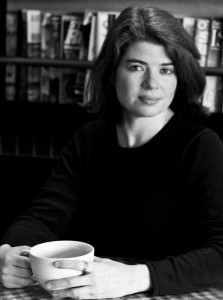Today’s post comes from Jennifer Willis, a Portland, Ore., author, essayist and journalist whose new YA urban/fantasy novel, Valhalla, is available at Amazon, Barnes & Noble and Goodreads. Visit her online at jennifer-willis.com.

A number of years ago, when I was working full-time for a communications company and trying to make time to write a novel, Stephen Hawley Martin told me that if I got up an hour early every day to write a page of my story, in a year I’d have a first draft.
A year?
As much as I wanted to write fiction, who wants to spend an entire year working on a first draft — something that will then have to be rewritten a few times, edited, revised? And so I put off writing fiction.
It’s tough to carve time out of a busy, full-time work schedule to sit down and write fiction — it’s even worse when you’re already writing for a living, and the last thing you want to do is spend even more time in front of the computer stringing words together.
I imagine this was part of the impetus pushing Chris Baty and friends to invent National Novel Writing Month in 1999 — an insane effort to write a 50,000-word first draft in 30 days. In the twelve years since, NaNoWriMo has become an international event that takes place every November, challenging new and experienced writers around the world to write an average of 1,667 words each day. If you make it to the end, you have the first draft of a novel, ready to be picked apart for rewriting.
I’ve done NaNoWriMo every year since 2004, and it works for me. I like the competitive spirit, the cooperation and support found on the online forums, and the fact that I’m committed to a new fiction project. One of these manuscripts — my 2008 NaNoWriMo project — has recently been released as an ebook, with two more to follow this summer.
But what if you don’t want to wait until November to start your project? Or what if you can’t necessarily commit to writing every day — or nearly every day — for an entire month?
Don’t Do What I Did
First off, don’t do what I did when I wrote my first novel. Between 1999 and 2001, I wrote snippets here and there, sitting at airport gates waiting for my plane or late at night when I couldn’t sleep. I didn’t have a structure for my writing time, and I hadn’t given myself a hard deadline either. The process went on, and on, and on. Looking back, it seems a miracle that thing ever got finished.
Treat your fiction project like you would any writing assignment. Map out what needs to get done with an estimate of how long each step takes. What’s your target word count? Look at books or short stories in your genre to get a feel for how long your project should be. How many words can you write in an hour? What time can you block off — consistently — for writing, and what dedicated space can you use?
From there, set a challenging but realistic deadline — and find a way to hold yourself accountable. When you don’t have an editor breathing down your neck for your story that was due two days ago, motivation can be on the slim side. Setting up rewards for yourself — like a spa day — for meeting your deadline can be a great incentive, but sometimes you need more of a stick than a carrot. One trick Baty suggests is to make a check out to a friend for all the money you have, and post-date it for the day after your deadline. At the start of your project, give the check to your friend — with instructions to cash it if you miss the mark.
How to Create a Fiction Writing Schedule
For example, if you want to write a 7,500-word science fiction short story, and you write an average of 1,200 words per hour, you’re looking at 6.25 hours for your first draft. Also factor in research time, but don’t let yourself go overboard. One rule of thumb I’ve learned for first drafts of fiction is if you do a Google search and you can’t find what you’re looking for within three-to-five mouse clicks, leave a placeholder for the information and come back to it in the rewrite.
Let’s assume you want to spend 3.75 hours on research, giving us a nice round figure of 10 hours for your short story project. Now grab your calendar and figure out where those 10 hours are going to come from. If you’ve got every Wednesday night free — great! Block out two hours every Wednesday night for five weeks, and there’s your project time.
If you only make vague plans to “Do some writing this weekend” after all the errands are run, or wait to start writing until you “feel inspired,” you know you’re never going to do it, right?
Whatever time you can schedule, make it as consistent as you can, so you’ll get into a rhythm with your writing. And keep this time sacred, just as you wouldn’t let hell or high water keep you from a meeting with an editor from one of your dream markets. It’s way too easy to let life start to slide into your fiction time, but if you treat it like it’s any other work commitment, you’re more likely to get your project done on time.
In the end, regardless of special strategies and neat tips and tricks, it comes down to just making yourself do it. No matter how much you want to write your novel or short story, you’ll still likely find yourself procrastinating and coming up with every excuse in the book not to do it — which reminds me … when your writing time comes around, make sure you turn of the television or radio, close the door, or otherwise eliminate what is likely to distract you from your work. But just as Sting acknowledged that you have to treat songwriting as job and simply make yourself do it, the only way your fiction is going to get done is if you sit yourself down and write.

RE NaNoWriMo … I’ve *just* discovered that there’s another annual month for writing a first draft: July Novel Writing Month (JulNoWriMo: http://julnowrimo.com/).
JulNoWriMo doesn’t have nearly the same traction (yet) that NaNoWriMo enjoys, but this does give writers the same novel-writing framework at another time of year, in case November isn’t convenient.
The folks at NaNoWriMo have also inspired a month of fiction editing — NaNoEdoMo (http://www.nanoedmo.net/) — every March. And there’s a month of frantic scriptwriting — ScriptFrenzy (http://www.scriptfrenzy.org/) — every April.
Jennifer: Thanks again for the great guest post, and for the additional information.
Michelle
Jennifer,
You’ve done NaNoWriMo every year since 2004?! Wow. Good on ya.
It really does sound like the kick in the pants I might need. I’ve been “writing” a memoir for a couple of years now and have barely anything done. Any idea if there’s a non-fiction month?
Appreciate your tips! I am going to put some into practice… just as soon as I can stop procrastinating. 😉
Lisa
Lisa:
There’s no hard-and-fast rule that NaNoWriMo is for fiction only. Yes, the idea is that you’ll start and finish a new fiction project, but writers use this month to suit whatever they’re working on — it’s all about having a crazy-productive month with support (and friendly competition) from other writers who are doing the same.
There might, however, be other annual “events” that speak more to the project you’re working on. And if not … you could start your own!
Good point, that’s exactly what I did when I started the blogathon.
Michelle
I’m very fortunate to have an indulgent partner who leaves me alone for the 1.5 – 2 hours per evening set aside for me to write. Sometimes it’s hugely productive, other times a bust, but one thing keeps me plugging away on a constant basis – I want to know what happens next, even if no one else does!
That’s great, Alice — keep it up!
As much as I hate to admit it, structure is key. Only when I have specific writing quotas and scheduled times to write do I find myself completing my own projects. (Never have trouble completing the things I write for other folks!)
It’s great that you’ve been so consistent in pursuing you work.
Hi Jennifer and Michelle! Thanks for the info. Now, if I can just put it to practice. This really pumps me up. I’m attending a writing conference this weekend. Can’t wait!
Going to writer’s conferences is so energizing, I always pick up great tips and love meeting people. Hope yours is a good one.
Michelle